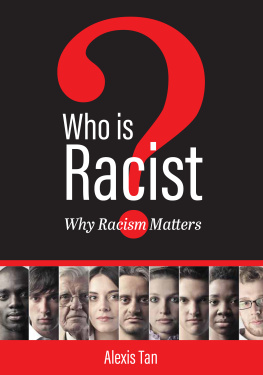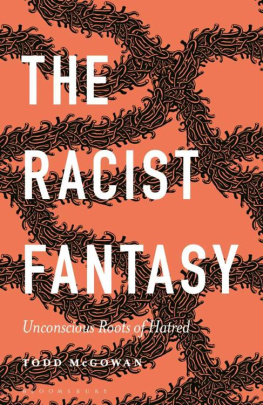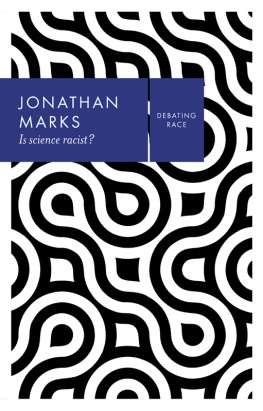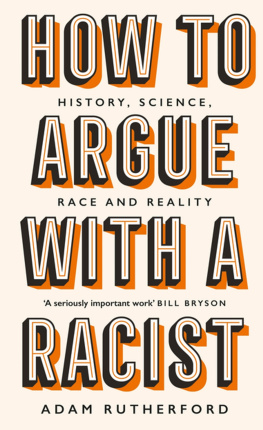Alexis Tan - Who is Racist? Why Racism Matters
Here you can read online Alexis Tan - Who is Racist? Why Racism Matters full text of the book (entire story) in english for free. Download pdf and epub, get meaning, cover and reviews about this ebook. year: 2020, publisher: Cognella, genre: Politics. Description of the work, (preface) as well as reviews are available. Best literature library LitArk.com created for fans of good reading and offers a wide selection of genres:
Romance novel
Science fiction
Adventure
Detective
Science
History
Home and family
Prose
Art
Politics
Computer
Non-fiction
Religion
Business
Children
Humor
Choose a favorite category and find really read worthwhile books. Enjoy immersion in the world of imagination, feel the emotions of the characters or learn something new for yourself, make an fascinating discovery.
- Book:Who is Racist? Why Racism Matters
- Author:
- Publisher:Cognella
- Genre:
- Year:2020
- Rating:5 / 5
- Favourites:Add to favourites
- Your mark:
- 100
- 1
- 2
- 3
- 4
- 5
Who is Racist? Why Racism Matters: summary, description and annotation
We offer to read an annotation, description, summary or preface (depends on what the author of the book "Who is Racist? Why Racism Matters" wrote himself). If you haven't found the necessary information about the book — write in the comments, we will try to find it.
Who is Racist? Why Racism Matters — read online for free the complete book (whole text) full work
Below is the text of the book, divided by pages. System saving the place of the last page read, allows you to conveniently read the book "Who is Racist? Why Racism Matters" online for free, without having to search again every time where you left off. Put a bookmark, and you can go to the page where you finished reading at any time.
Font size:
Interval:
Bookmark:

Copyright 2021 by Alexis Tan. All rights reserved. No part of this publication may be reprinted, reproduced, transmitted, or utilized in any form or by any electronic, mechanical, or other means, now known or hereafter invented, including photocopying, microfilming, and recording, or in any information retrieval system without the written permission of Cognella, Inc.
Trademark Notice: Product or corporate names may be trademarks or registered trademarks, and are used only for identification and explanation without intent to infringe.
Cover image: Copyright 2017 iStockphoto LP/bowie15.
Printed in the United States of America.

For activists protesting racism everywhere: Change is coming.
A s I write, thousands of Americans are demonstrating coast to coast to protest the death of George Floyd. Mr. Floyd, a Black man described by family as a gentle giant, died while a White police officer had his knee on Mr. Floyds neck for almost 9 minutes, including 3 minutes after he was not responsive. Mr. Floyd was lying prone on the sidewalk, handcuffed behind his back, and was not resisting. He pleaded several times, Please, I cant breathe, and at one point called for his mother. The police officer who did not release his knee even after Mr. Floyd lay motionless on the sidewalk was arrested, booked, and charged with second-degree murder. Mr. Floyds killing was one of several deaths of Black men and women in the past several years at the hands of police or, in at least one case, White vigilantes. Rage and pain showed in the faces of demonstrators, Black, Brown, White, men, women, mostly young. Some invoked Martin Luther King Jr., who, while advocating nonviolence said in a speech at Stanford, A riot is the language of the unheard. A Justice for George Floyd petition on Change.org started by a 15-year old generated more than 6.3 million signatures in 24 hours at the rate of one signature every 2 seconds, the fastest growing petition ever in Change.org. Nike posted on its Instagram account, which reaches 112 million followers, the following:
For once, Dont Do It: Dont pretend theres not a problem in America. Dont turn your back on racism. Dont accept innocent lives being taken from us. Dont make any more excuses. Dont think this doesnt affect you. Dont sit back and be silent. Dont think you cant be part of the change. Lets all be part of the change.
In response to protests, some turning violent, the president of the United States exhorted governors to use force and the military to confront the protesters, threatening to unleash vicious dogs and ominous weapons on those who breached the White House wall and 10-year prison sentences for protesters who were arrested. As I write tonight, these are the words and images in my mind.
I wrote most of this book before George Floyds death. Most of America is angry, disgusted, frustrated, and grieving. My commentary on racism and many of the examples I use to demonstrate racism seem now to be tepid academic exercises from an ivory tower that do not capture the seriousness of the problem. Racism is a public health hazard in America. People of color are victimized every day. So are poor people, people without power. Innocent Black men and women are being killed with alarming frequency. If there is a silver lining, most Americans of every color want to do something about it. But how do you change a system? How do you change a culture? How do you reverse a history of exploitation? Change, a university president I admire once told me, begins with each one us. So, its up to us to confront racism, understand what it is, and control it in our personal and professional lives.
If you are like most people, race is not among your favorite topics. We dont like to talk about how some police officers might be racist; how some of our government officials, doctors, teachers, judges, journalists, neighbors, the media, the American political and economic systems might be racist. We dont like to talk about how Black, White, and Brown people may be different from each other, or how we like some people better than others because of their skin color. We dont talk about race because it makes us uncomfortable. What is the right thing to say so we dont appear to favor one race over another? Or worse, so we dont appear to be racist? So, we keep quiet, avoid or change the topic, talk about how we are coping with the Coronavirus pandemic and our plans for next year. When the topic comes up, we say, Race is not my problem. Or, if we agree that racism is everyones problem, we may become frustrated because we are at a loss when asked what we can do about it, so we stop talking.
But some of us dont have a choice. People of color are victims every day, such as the mother who fears for her teenage son when he goes jogging in a park. Research tells us that Black Americans talk about race more often to their children than White Americans, to prepare their children for a racist world. I talk about race to my graduate and undergraduate college students at a large public university where I am a professor. I teach a course called Communication, Stereotypes and Prejudice and do academic research on why most people are unconsciously biased and how these biases can be controlled. My teaching and research have been shaped by personal experiences with prejudice and by my academic training at the University of Wisconsin-Madison where I was introduced to civil rights activism, volumes of research on the origins and consequences of racism, and the professors who did the research. So, you might say that I was programmed to do my work and, in a more specific sense, to write this book.
Fueling my work and trying to remain objective have been experiences and observations demonstrating that race indeed matters at a personal level and, more importantly, in American culture and society: People are treated and evaluated differently because of the color of their skin. This realizationthat skin color mattershas roots in my childhood in the Philippines, a former colony of the United States, and was later reinforced by experiences and observations as an immigrant in the United States.
My attempts at understanding and providing coherence to these experiences have largely been limited to journal articles and textbooks I have authored, filled with data and charts, reaching primarily other academics and students. This book is an attempt to reach you, a larger audience. I hope to show how race indeed matters, and why racism affects all of us, and, more importantly, how we can each do our share to control racism.
The time is now to talk about race. Race relations in the United States have deteriorated in the past 4 years, while violent hate crimes have increased. Large majorities of Americans say racism remains a major problem Whether this is a fair assessment can be informed by recent scientific research about how racist acts are activated. I tell you about this research in this book, along with recent advances in our understanding of the consequences of racism, and, on an optimistic note, how racism can be controlled.
I revised this preface after George Floyds death. For sure, events still to unfold will alter the narrative. But, the basic premise of this book remains: Race matters.
To my family, for sharing your stories, thank you.
M any of us see racism as the other persons problem because we are not racist. Unless we are victims, racism is what we read about in newspapers or see in nightly television news, not a reality we have to face day to day. But racism is a problem for all of us. Large majorities of Americans believe that racism is a major problem in American society. Some White supremacists have called for a race war. News and social media posts are filled with stories about racist acts: a Black man shot to death by vigilantes while jogging, police being called by racists to investigate people of color engaged in lawful everyday activities in personal and public spaces. Is the immigration question about race? Are government policies and statements by the president and other government officials regarding the COVID-19 pandemic based on race? Most people, and some journalists, are reluctant to call racist acts racist, prompting the Associated Press to recommend that journalists call it what it is; do not use racially charged or similar terms as euphemism for racist or racism when the latter terms are truly applicable. Science can help us understand racism. So can stories from the frontlines. Considering the increase in recent years of racist hate crimes and incidents, there is some urgency for people like you and me to take responsibility for mitigating the problem. And the first step is talking about racism and understanding the nature of the beast.
Font size:
Interval:
Bookmark:
Similar books «Who is Racist? Why Racism Matters»
Look at similar books to Who is Racist? Why Racism Matters. We have selected literature similar in name and meaning in the hope of providing readers with more options to find new, interesting, not yet read works.
Discussion, reviews of the book Who is Racist? Why Racism Matters and just readers' own opinions. Leave your comments, write what you think about the work, its meaning or the main characters. Specify what exactly you liked and what you didn't like, and why you think so.






